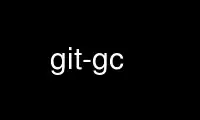
This is the command git-gc that can be run in the OnWorks free hosting provider using one of our multiple free online workstations such as Ubuntu Online, Fedora Online, Windows online emulator or MAC OS online emulator
PROGRAM:
NAME
git-gc - Cleanup unnecessary files and optimize the local repository
SYNOPSIS
git gc [--aggressive] [--auto] [--quiet] [--prune=<date> | --no-prune] [--force]
DESCRIPTION
Runs a number of housekeeping tasks within the current repository, such as compressing
file revisions (to reduce disk space and increase performance) and removing unreachable
objects which may have been created from prior invocations of git add.
Users are encouraged to run this task on a regular basis within each repository to
maintain good disk space utilization and good operating performance.
Some git commands may automatically run git gc; see the --auto flag below for details. If
you know what you’re doing and all you want is to disable this behavior permanently
without further considerations, just do:
$ git config --global gc.auto 0
OPTIONS
--aggressive
Usually git gc runs very quickly while providing good disk space utilization and
performance. This option will cause git gc to more aggressively optimize the
repository at the expense of taking much more time. The effects of this optimization
are persistent, so this option only needs to be used occasionally; every few hundred
changesets or so.
--auto
With this option, git gc checks whether any housekeeping is required; if not, it exits
without performing any work. Some git commands run git gc --auto after performing
operations that could create many loose objects.
Housekeeping is required if there are too many loose objects or too many packs in the
repository. If the number of loose objects exceeds the value of the gc.auto
configuration variable, then all loose objects are combined into a single pack using
git repack -d -l. Setting the value of gc.auto to 0 disables automatic packing of
loose objects.
If the number of packs exceeds the value of gc.autoPackLimit, then existing packs
(except those marked with a .keep file) are consolidated into a single pack by using
the -A option of git repack. Setting gc.autoPackLimit to 0 disables automatic
consolidation of packs.
--prune=<date>
Prune loose objects older than date (default is 2 weeks ago, overridable by the config
variable gc.pruneExpire). --prune=all prunes loose objects regardless of their age (do
not use --prune=all unless you know exactly what you are doing. Unless the repository
is quiescent, you will lose newly created objects that haven’t been anchored with the
refs and end up corrupting your repository). --prune is on by default.
--no-prune
Do not prune any loose objects.
--quiet
Suppress all progress reports.
--force
Force git gc to run even if there may be another git gc instance running on this
repository.
CONFIGURATION
The optional configuration variable gc.reflogExpire can be set to indicate how long
historical entries within each branch’s reflog should remain available in this repository.
The setting is expressed as a length of time, for example 90 days or 3 months. It defaults
to 90 days.
The optional configuration variable gc.reflogExpireUnreachable can be set to indicate how
long historical reflog entries which are not part of the current branch should remain
available in this repository. These types of entries are generally created as a result of
using git commit --amend or git rebase and are the commits prior to the amend or rebase
occurring. Since these changes are not part of the current project most users will want to
expire them sooner. This option defaults to 30 days.
The above two configuration variables can be given to a pattern. For example, this sets
non-default expiry values only to remote-tracking branches:
[gc "refs/remotes/*"]
reflogExpire = never
reflogExpireUnreachable = 3 days
The optional configuration variable gc.rerereResolved indicates how long records of
conflicted merge you resolved earlier are kept. This defaults to 60 days.
The optional configuration variable gc.rerereUnresolved indicates how long records of
conflicted merge you have not resolved are kept. This defaults to 15 days.
The optional configuration variable gc.packRefs determines if git gc runs git pack-refs.
This can be set to "notbare" to enable it within all non-bare repos or it can be set to a
boolean value. This defaults to true.
The optional configuration variable gc.aggressiveWindow controls how much time is spent
optimizing the delta compression of the objects in the repository when the --aggressive
option is specified. The larger the value, the more time is spent optimizing the delta
compression. See the documentation for the --window' option in git-repack(1) for more
details. This defaults to 250.
Similarly, the optional configuration variable gc.aggressiveDepth controls --depth option
in git-repack(1). This defaults to 250.
The optional configuration variable gc.pruneExpire controls how old the unreferenced loose
objects have to be before they are pruned. The default is "2 weeks ago".
NOTES
git gc tries very hard to be safe about the garbage it collects. In particular, it will
keep not only objects referenced by your current set of branches and tags, but also
objects referenced by the index, remote-tracking branches, refs saved by git filter-branch
in refs/original/, or reflogs (which may reference commits in branches that were later
amended or rewound).
If you are expecting some objects to be collected and they aren’t, check all of those
locations and decide whether it makes sense in your case to remove those references.
HOOKS
The git gc --auto command will run the pre-auto-gc hook. See githooks(5) for more
information.
Use git-gc online using onworks.net services